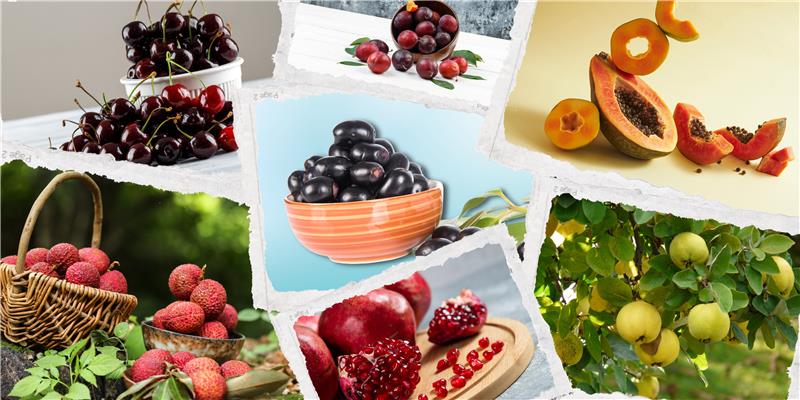Monsoon or rainy season in India fills the surroundings with happiness and a fresh vibe. While most of us think of chai and pakodas (fritter), fruit choices become picky in this season, leading us to more health concerns. Fruits with low water content and tough skin like, pomegranates, apples, and dried fruits, are recommended to avoid health risks connected to waterborne bacteria.
A healthy diet provides several health benefits, which help prevent health problems. Nature supports our body through seasonal fruits during the monsoon.
During the monsoon, rainy season fruits grow naturally and offer the right nutrition that our body needs. These fruits are more tasty, refreshing, and rich in immunity-boosting nutrients.
But before we look at the best fruits for the rainy season, let’s understand why fruits are important and why we should prefer them over packaged or junk foods, especially during the monsoon.
Importance of Fruits for a Healthy Life
In this modern era, most individuals prefer to eat junk food or other packaged food as these food items are more tasty and spicy. But it leads to several health issues like obesity, diabetes, and more. On the other hand, fruits are beneficial for living a disease-free life.
Fruits are full of vitamins, minerals, and fiber. Unlike processed foods, fruits come without added sugar, oil, or preservatives. They are easy to digest and help cleanse our system.
Here’s why fruits are better than junk food:
- Boost Immunity: Fruits are rich in Vitamin C, A, potassium, and other minerals that help the immune system fight diseases.
- Improve Digestion: The fiber in fruits promotes good digestion and prevents constipation.
- Keep You Hydrated: Most fruits have high water content, which helps maintain fluid balance in the body.
- Provide Natural Energy:The natural sugars in fruits provide energy without causing sugar crashes.
- Protect Against Lifestyle Diseases:Regular fruit intake helps in reducing the risk of diabetes, high blood pressure, and heart disease.
During the rainy season in India, digestion slows down, and immunity becomes weak. This is why switching to fresh, seasonal fruits is the best choice.
Why Choose Seasonal Fruits Monsoon?
Seasonal fruits in India grow with the weather, so monsoon fruits have the right nutrients your body needs during the rainy season.
They are fresher, tastier, and more affordable. On the other hand, non-seasonal or imported fruits often lose their nutrients due to long storage and transport.
So, when you eat monsoon fruits, you are not just enjoying the taste—you are aligning your health with nature.
7 Best Rainy Season Fruits and Their Health Benefits
Now, let’s explore the top 7 rainy season fruits in India and see why they are essential during the monsoon.
Jamun (Indian Blackberry)
Jamun, a deep purple or black fruit, is typically available from mid to late monsoon. It has a sweet, slightly sour, and astringent taste that makes it both refreshing and medicinal.
This fruit is rich in Vitamin C, iron, and anthocyanin antioxidants, which help boost immunity, improve liver function, and regulate blood sugar levels.
Jamun also supports hemoglobin production and enhances oxygen circulation in the body, making it one of the most powerful seasonal fruits in India for maintaining energy and health during the monsoon.
Litchi is a vibrant fruit of the early monsoon, known for its very sweet and juicy taste. This fruit is loaded with Vitamin C, B-complex vitamins, copper, and polyphenols, making it a powerful immunity booster during the humid monsoon season.
Litchi’s high water content keeps the body hydrated, while its nutrients help in tissue repair, energy restoration, and protection from infections.
Regular consumption of litchi during the monsoon can help prevent fatigue, boost blood circulation, protect against viral illnesses, and keep the skin healthy and glowing.
Papaya is a soft, mildly sweet fruit with orange flesh and black seeds, available year-round, but especially helpful during the monsoon. The humid weather often slows down digestion, and papaya helps restore balance with papain, a natural digestive enzyme.
It’s rich in Vitamin A, Vitamin C, fiber, folate, and other nutrients that cleanse the gut and support overall health. Regular consumption during the rainy season improves gut health, prevents constipation, boosts immunity, reduces skin problems like acne, and helps in lowering inflammation, making it an ideal fruit for maintaining wellness in the monsoon.
Pomegranate is a juicy fruit with bright red seeds (arils), known for its sweet-tart taste and crunchy texture. Though available year-round, it’s especially beneficial during the monsoon, when the body often feels low on energy.
Rich in iron, polyphenols, flavonoids, and Vitamins C and K, pomegranate helps build strength and fights common monsoon infections. It’s powerful antioxidant, punicalagin, supports healthy blood flow, enhances immunity, and speeds up recovery from illness.
Regular consumption boosts blood production, prevents anemia, supports heart health, and helps balance blood pressure, making it one of the most valuable rainy season fruits.
Pear grows naturally during the monsoon and is very refreshing in humid weather. Pear is full of water and dietary fiber, which makes it easy to digest. It also contains potassium, Vitamin C, and is low in calories.
Eating a pear helps prevent bloating, reduces acidity, and keeps the body hydrated. It also helps control cholesterol, manage blood pressure, and support weight loss.
Plum is a sweet fruit with a deep red to purple color. It is available from monsoon to early autumn. Plums are rich in antioxidants and Vitamin A, which help fight infections and support eye health.
Eating plums can improve digestion, prevent constipation, and fight signs of aging. They also help cleanse the liver, improve blood health, and enhance skin texture.
Conclusion
The monsoon season is beautiful, but it also challenges your immune system. Choosing the right rainy season fruits can help you stay energized, fight infections, and enjoy the season without health issues.
All the fruits mentioned here are part of the traditional rainy season fruits in India, and they grow naturally to support your body during this time. Add them to your daily routine, enjoy them fresh, and feel the difference.
Cherry is a bright red fruit with a sweet taste and a hint of tanginess. It grows in the early part of the monsoon season and offers both great flavor and health benefits. Cherries are packed with Vitamin C, melatonin, and anthocyanins.
They also contain natural anti-inflammatory compounds. Including cherries in your diet can improve sleep during humid nights, ease joint pain, lower inflammation, keep your skin looking young, and reduce muscle tiredness.

























































Leave a Comment